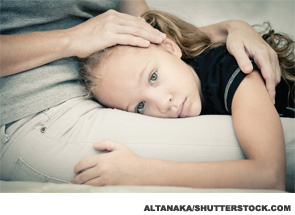
For children in chronic pain, an innovative pain management program that focuses on self-management of symptoms and strong parental involvement is showing promising effects on reducing pain and improving function in these children.
Key to the program, according to Rachael Coakley, PhD, associate director, Psychological Services, Pain Treatment Service, Boston Children’s Hospital, is changing the mindset of the children and their parents to think about pain differently, as well as providing strategies to manage the pain.
Also needed is a change in the mindset of physicians and other healthcare professionals who see children with chronic pain. The goal of the program is for providers to recognize that pain—regardless of origin—improves when children and parents know how to manage the symptoms adaptively.
“Psychological strategies for pain management should be prescribed early as part of a primary intervention for chronic pain instead of waiting until children develop functional disability or significant symptoms of anxiety or depression,” she says, adding that the comment she most often gets from parents is that they feel their kids get referred to psychologists only when there is not much else physicians feel they can do to address the chronic pain.
Dr. Coakley, who designed the program, emphasizes that the program is intended as a primary treatment for chronic pain and pain-related stress and not necessarily as an intervention for mental health problems, such as anxiety or depression.
“Ideally, this intervention functions as an integrated part of a child’s care and is not reserved for kids who have not responded to standard medical protocols,” she says.
Awareness of this program by rheumatologists who see children with chronic pain may provide a needed resource for these children beyond what has traditionally been available for them.
The Comfort Ability
Called the Comfort Ability, the program is designed for children and adolescents ages 10–17 years old with chronic or recurrent pain syndromes and their parents. Children enrolled in the program present with a broad range of pain conditions, including abdominal pain syndromes, neuropathic pain, headaches, fibromyalgia and pain amplification syndrome, as well as disease-related pain. Dr. Coakley emphasized that the strategies used to help these children better cope with their pain is the same regardless of the underlying cause of the pain or different levels of functional disability.
Held at the Pain Treatment Service at Boston Children’s Hospital, the program runs every eight weeks and consists of a one-day, six-hour-long workshop that is held on a Sunday to minimize disruption to school and work schedules. The workshop is divided into two groups that run separately, but simultaneously, for the six hours. One group is for children, and the other is for their parents or adult caretakers.
Children’s Group
Led by clinical psychologists, the children’s group uses a motivational interviewing framework to increase the child’s readiness to change their relationship to the pain they are experiencing. The group provides a framework for educating children on how pain works in the body, teaches coping skills to increase their physical comfort and provides guidance for how children can learn to reframe the impact of pain on their daily living.

